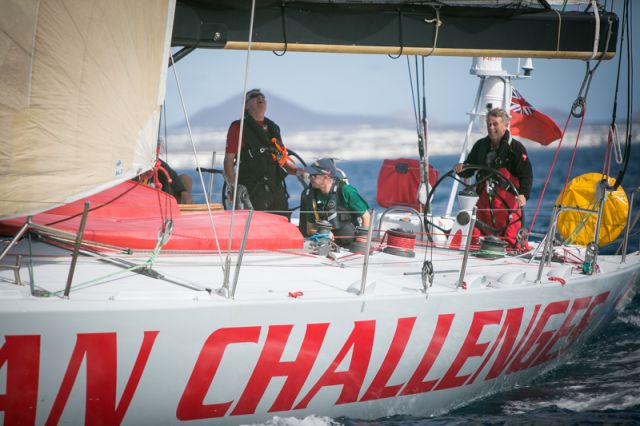
The inaugural RORC Transatlantic Race, in association with the International Maxi Association (IMA), started on Sunday 30th November 1000 UTC from Puerto Calero, Lanzarote, Canary Islands bound for Grenada, West Indies, 2,995 nautical miles across the Atlantic Ocean.
After a competitive start the fleet have been battling through the first night to negotiate the fastest passage through the Canary Islands and into the open waters of the Atlantic Ocean. The entire fleet chose the northerly route through the channel between Lanzarote and Fuerteventura and once again north of Tenerife. The northerly route puts the fleet nearer the fresh breeze coming from the north rather than south where an area of little wind has developed. The rhumb line goes straight through Tenerife but the highest point, Mount Teide, has an elevation of 3,718 m (12,198ft), which would give a significant wind shadow to any yachts that ventured south.
Derek Hatfield's Volvo 60, Spirit of Adventure, is estimated to be the early leader after time correction for the IRC Zero fleet. Rating far lower than the Maxi yachts in the class, Spirit of Adventure's lead is not surprising after less than 24 hours at sea; the Canadian team are highly experienced with six of the crew having raced the boat across the Atlantic before.
Jeremy Pilkington's RP78, Lupa of London. have used their 'wompa' Code Zero to great effect, sailing high and fast across the top of Tenerife to take the overall lead on the water during the night. At dawn, Lupa of London was 40 miles from the last island, La Palma, achieving a boat speed over twice as fast as the Finot 100, Nomad IV, sailed by Jean-Paul Riviere. It will be interesting to see the tactics employed by Lupa of London at La Palma. Further behind, the young team on American Class40, Oakcliff Racing, have also altered course to follow Lupa of London's track.
Aref Lahham's Swan 68, Yacana, is the clear leader in IRC One and is currently estimated to be leading the race after time correction. Most of the team hail from Greece and have sailed with each other for years and this understanding was exemplified at the start, when a spinnaker peel was pulled off with precision, to gain a big advantage. During the first night, the wind speed and direction has been in a constant state of flux and Team Yacana may well have gained the lead through good sail changing decisions and slick crew work.
Last night, Yacana sent this message from on board: “We have good wind with a few slow moments, otherwise we are doing fine. Spirits are good, thank God no rain...We are leaving the Island of Tenerife eight miles on our port and plan to be in the open ocean in about 16 hours, then heading to Grenada. Cheers to all.” - S/Y Yacana.
A tremendous battle kicked off right from the start in IRC Two, Frank Lang's French X 40, Optim'X, sailed intelligently to take the lead from Nigel Passmore's British J/133, Apollo 7, at the start, which the French team held right along the coast of Lanzarote. Apollo 7, mainly crewed by friends from Plymouth, took a slender lead after passing the southern tip of Lanzarote and unfurled their Code Zero to open up a three mile lead on their rivals by dawn. Optim'X has a small rating advantage over Apollo 7 and this may develop into one of the closest battles in the RORC Transatlantic Race. Denis Villotte's French JNP 12, Sérénade, is currently bringing up the rear, but estimated to be fourth overall after time correction. The twin keel design is the smallest and lightest yacht in the race and, with just three crew on board, is more suited to the downwind conditions that should feature in the race over the coming days.
Nigel Passmore reports from the course on Apollo 7: “We are round the top of Tenerife and en route to La Palma with a welcome to offshore Atlantic sailing more like the English Channel! Rain, waves and wind shifts. Still heading in the right direction with a good breeze. Crew are happy and settling in. Very much waterline length at the moment.”
Sail choice and boat handling have been the major factors to performance at this early stage in the race. Getting into the open waters of the Atlantic first pays high dividend as more wind is expected for the leaders. Just a few hours difference can turn into enough miles for leading yachts to disappear over the horizon. All of the fleet should pass La Palma into the Atlantic today, raising spinnakers which should be flying for the foreseeable future. After days of confused weather systems, the Trade Winds are forecast to re-establish over the coming days. Downwind racing, surfing down Atlantic rollers with the sun on your back – it doesn't get a lot better than that.